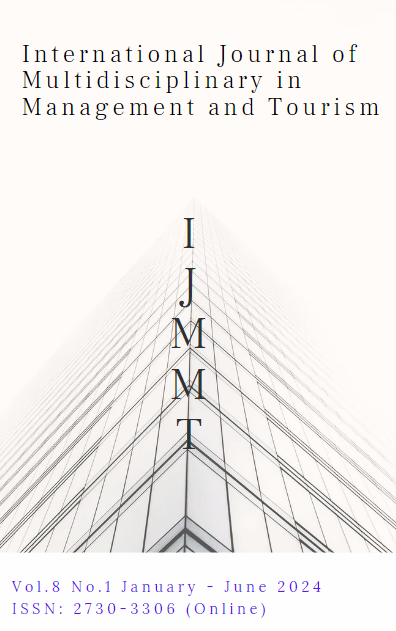Supply Policy Implication of Public Cultural Services in Urban Communities from The Perspective of Overall Governance: A Case Study Take Zhanjiang Community
Main Article Content
Abstract
Urban public service is an important issue for government policy that should be understood by the public and should be coordinated with regulatory agencies and decentralized between different levels of government. Take care of public community cultural services because it matches the theory of holistic governance. This article aimed to 1) study the information of the people using the public cultural services of Zhanjing community and 2) study satisfaction in using public cultural services of communities in Zhanjing City. The study used representatives of three communities in Chikan District, Xiashan District, and Mazhang District from the four administrative regions of Zhanjiang Province, selected as R&D centers. A sample size of 900 people was used, with 884 questionnaires returned, the data collection tool is a questionnaire. In this study, the researchers used statistical methods to conduct basic statistics on the data, such as percentage, mean, standard deviation, and one-way analysis of varied. The research results were found as follows;
1. The respondents' personal information found that most of them were 586 females, and 298 males, with an average age of 21-30 years, most of them undergraduate education, 364 people, and most were students.
2. Most respondents are satisfied with community public cultural facilities and have a good attitude towards government public cultural facilities.
Article Details

This work is licensed under a Creative Commons Attribution-NonCommercial-NoDerivatives 4.0 International License.
References
Fei, X., Hamilton, G. G., & Zheng, W. (1992). From the soil: The foundations of Chinese society. University of California Press.
Hicks, E. P. (2000). Designation without conservation: The conflict between the endangered species act and its implementing regulations. Virginia Environmental Law Journal, 19, 491.
Hopwood, C. J., Harrison, A. L., Amole, M., Girard, J. M., C. Wright, A. G., Thomas, K. M., Sadler, P., Ansell, E. B., Chaplin, T. M., Morey, L. C., Crowley, M. J., Emily Durbin, C., & Kashy, D. A. (2018). Properties of the continuous assessment of interpersonal dynamics across sex, level of familiarity, and interpersonal conflict. Assessment, 27(1), 40-56. https://doi.org/10.1177/1073191118798916
Keynes, J. M., Moggridge, D. E., & Johnson, E. S. (1971). The Collected Writings of John Maynard Keynes. Macmillan.
Lau, H. C., Ning, A., Pun, K. F., Chin, K. S., & Ip, W. H. (2005). A knowledge‐based system to support procurement decision. Journal of Knowledge Management, 9(1), 87-100. https://doi.org/10.1108/13673270510582983
Li, W., Xu, C., Zhang, X., Xia, M., Yang, Z., Yan, H., Yu, H., Zhang, L., Shu, W., & Shu, J. (2021). Sodium manganese hexacyanoferrate as Zn ion host toward aqueous energy storage. Journal of Electroanalytical Chemistry, 881, 114968. https://doi.org/10.1016/ j.jelechem.2020.114968
National public Library resources. (2011-2021). Public libraries survey. https://www.imls. gov/research-evaluation/data-collection/public-libraries-survey
Paul, B. K. (2009). Why relatively fewer people died? The case of Bangladesh’s Cyclone Sidr. Natural Hazards, 50, 289-304. https://doi.org/10.1007/s11069-008-9340-5
Perry, J. (1977). Frege on demonstratives. The philosophical review, 86(4), 474-497. https://doi.org/10.2307/2184564
Pomeranz, E. F., & Stedman, R. C. (2020). Measuring good governance: Piloting an instrument for evaluating good governance principles. Journal of Environmental Policy & Planning, 22(3), 428–440. https://doi.org/10.1080/1523908X.2020.1753181
Weber, M. (1994). Weber: Political writings. Cambridge University Press.

